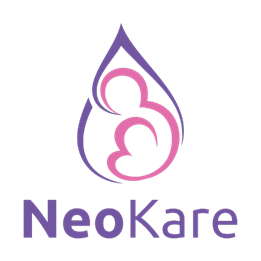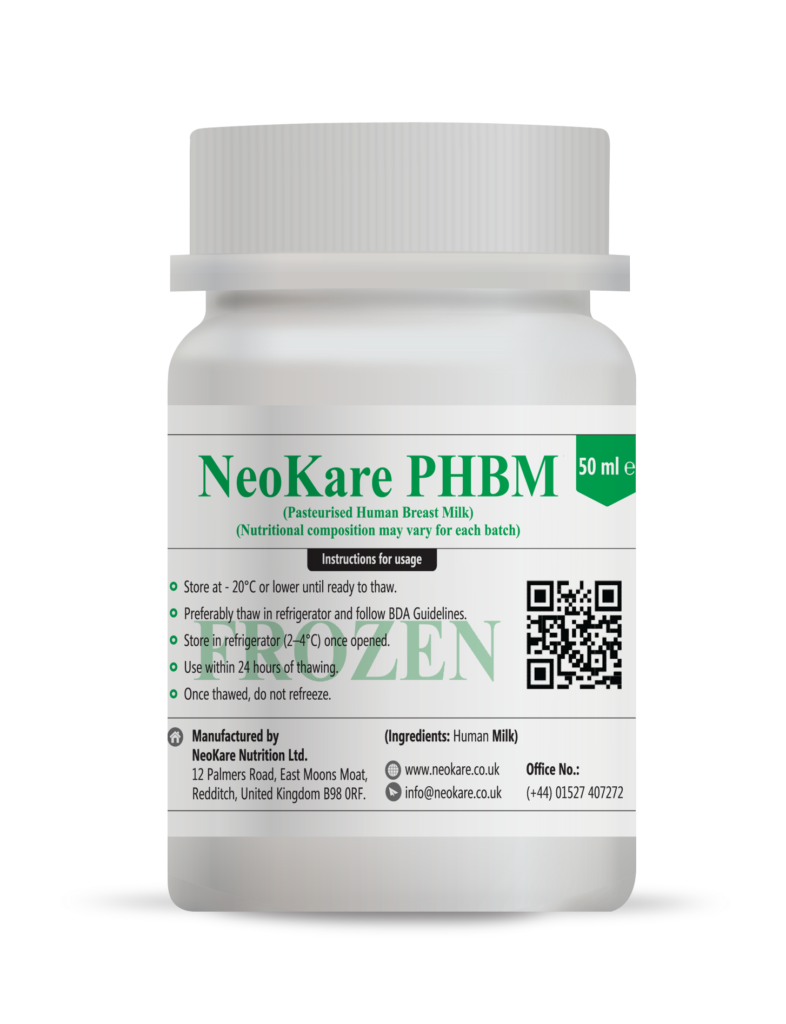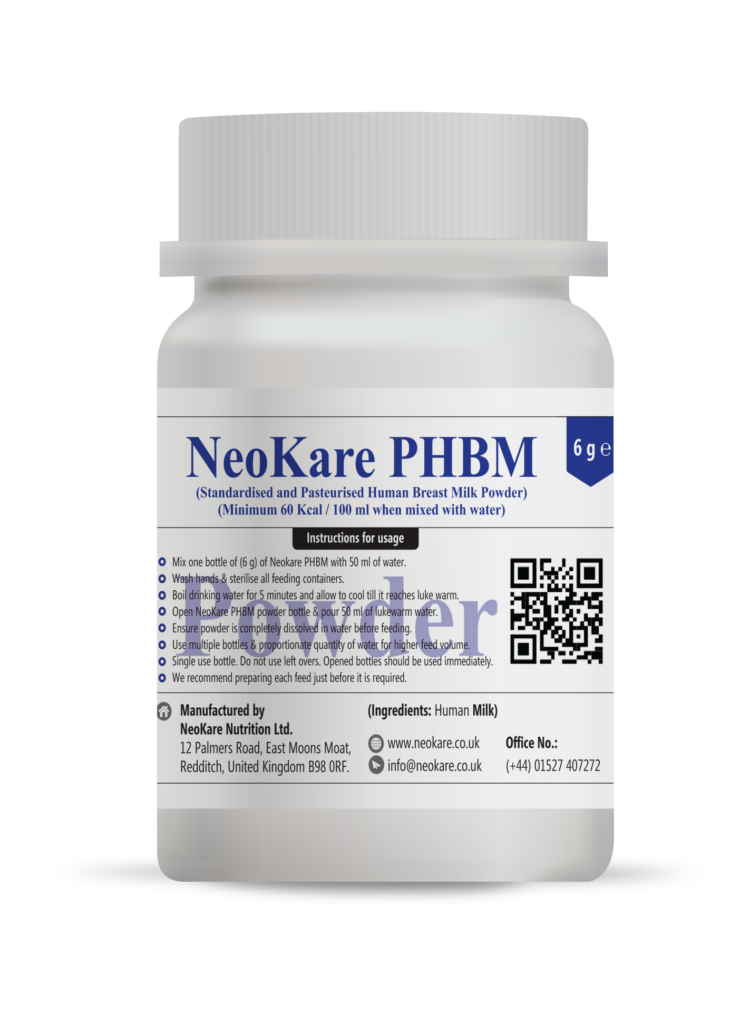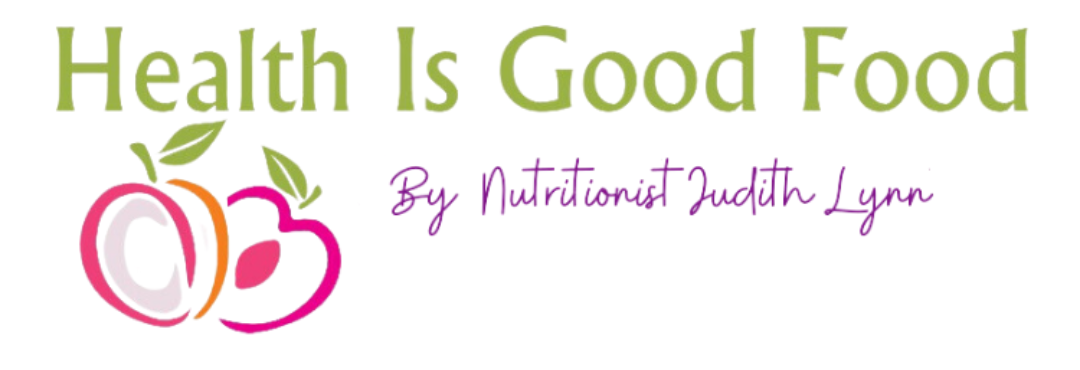Pasteurized Donor Human Milk

Difficulties of Breastfeeding and How Pasteurized Donor Human Milk can Help.
What is Donor Human Milk?
Donor Human milk is milk that has been provided by lactating women to a human milk bank or to NeoKare. Human Donor milk is pasteurised and then frozen.
Human milk is a near perfect proportion of nutrients, the concentrations of which alter to reflect the infant’s growing needs (1). It is an essential part of a healthy early childhood and it supports both the physical and neuro-cognitive development of the baby.
Who Are Neokare?

NeoKare Nutrition Ltd is a UK-based leading innovator in pasteurized breast milk processing using patented technology to provide pasteurized human breast milk products, ensuring that the unique nutritional demands of babies can be met.
NeoKare human milk bridges the gap to prevent a baby being topped up with cow’s milk formula. Pasteurized Donor human milk could provide a much-preferred alternative to this (3). NeoKare only uses milk from UK milk providers. Learn more about NeoKare human milk.
NeoKare PHBM


NeoKare Pasteurised Human Breast Milk (PHBM) is sourced from 100% Human Milk to meet the nutritional requirements of a baby and complies with NICE guidelines. NeoKare PHBM can be used when mother’s own milk supply is reduced, to top-up breastfeeds, or when a mother’s own milk is not available. It is available in liquid form which is delivered frozen in 50mls bottles.
NeoKare PHBM is also available in powdered form which is standardised and pasteurised for reconstitution. The resultant product is similar to that from a milk bank and complies with NICE guidelines. NeoKare PHBM Powder is available in a bottle of 6 g powder to be reconstituted with 50 ml water
Get 10% off with coupon code HIGF10.
Difficulties with Breastfeeding.
WHO and UNICEF recommend that children initiate breastfeeding within the first hour of birth and be exclusively breastfed for the first 6 months of life (2). In an ideal world all mothers would breastfeed their babies until at least 6 months. However some women find it extremely difficult, and some women cannot.
Why does a woman stop breastfeeding?
The most frequently reported problems associated with stopping breastfeeding are:
- Mother’s milk supply or a feeling of the baby ‘not getting enough’,
- A baby’s inadequate weight gain after birth,
- Lack of knowledge or education, small nipples or pain during breast feeding possibly due to a poor latch or a baby having a tongue tie (5, 6).
- Mothers mood associated with depression, anxiety, irritability, and confusion is linked with a shorter period of breastfeeding and is associated with reducing a mother’s milk supply (7).
Donor milk supports exclusive breastfeeding to 6 months.
Having to stop breastfeeding due to the factors listed above can be a cause of worry for the mother. This is where donor human milk could make a difference to those women who cannot breastfeed or have difficulty in maintaining a good milk supply.
I work with breastfeeding Mum’s so I know from speaking to them about the wonderful experience breastfeeding is, but also the difficulties. Neokare products can help because it serves to ‘support’ and ‘encourage’ her to continue to offer her own supply of breast milk to at least 6 months when the baby’s nutrition can be supplemented with food.
Neokare has collaborated with me to offer breastfeeding women a 10% off voucher on their first order of any of Neokare’s products.
Please use coupon code HIGF10. Click the ORDER NOW button to try it out for yourself.
References
- Nicholas J. Andreas, Beate Kampmann, Kirsty Mehring Le-Doare, Human breast milk: A review on its composition and bioactivity, Early Human Development, Volume 91, Issue 11, 2015, Pages 629-635, ISSN 0378-3782, https://doi.org/10.1016/j.earlhumdev.2015.08.013. (https://www.sciencedirect.com/science/article/pii/S0378378215001772)
- German JB, Freeman SL, Lebrilla CB, Mills DA. Human milk oligosaccharides: evolution, structures and bioselectivity as substrates for intestinal bacteria. Nestle Nutr Workshop Ser Pediatr Program. 2008;62:205-18; discussion 218-22
- https://www.who.int/health-topics/breastfeeding#tab=tab_2
- Karaçam Z, Sağlık M. Breastfeeding problems and interventions performed on problems: systematic review based on studies made in Turkey. Turk Pediatri Ars. 2018;53(3):134-148. Published 2018 Sep 1. doi:10.5152/TurkPediatriArs.2018.6350
- Lamontagne, C., Hamelin, AM. & St-Pierre, M. The breastfeeding experience of women with major difficulties who use the services of a breastfeeding clinic: a descriptive study. Int Breastfeed J 3, 17 (2008). https://doi.org/10.1186/1746-4358-3-17
- Cooklin, A.R., Amir, L.H., Nguyen, C.D. et al. Physical health, breastfeeding problems and maternal mood in the early postpartum: a prospective cohort study. Arch Womens Ment Health 21, 365–374 (2018). https://doi.org/10.1007/s00737-017-0805-y
- Wiciński M, Sawicka E, Gębalski J, Kubiak K, Malinowski B. Human Milk Oligosaccharides: Health Benefits, Potential Applications in Infant Formulas, and Pharmacology. Nutrients. 2020;12(1):266
This is a paid blog by NeoKare
